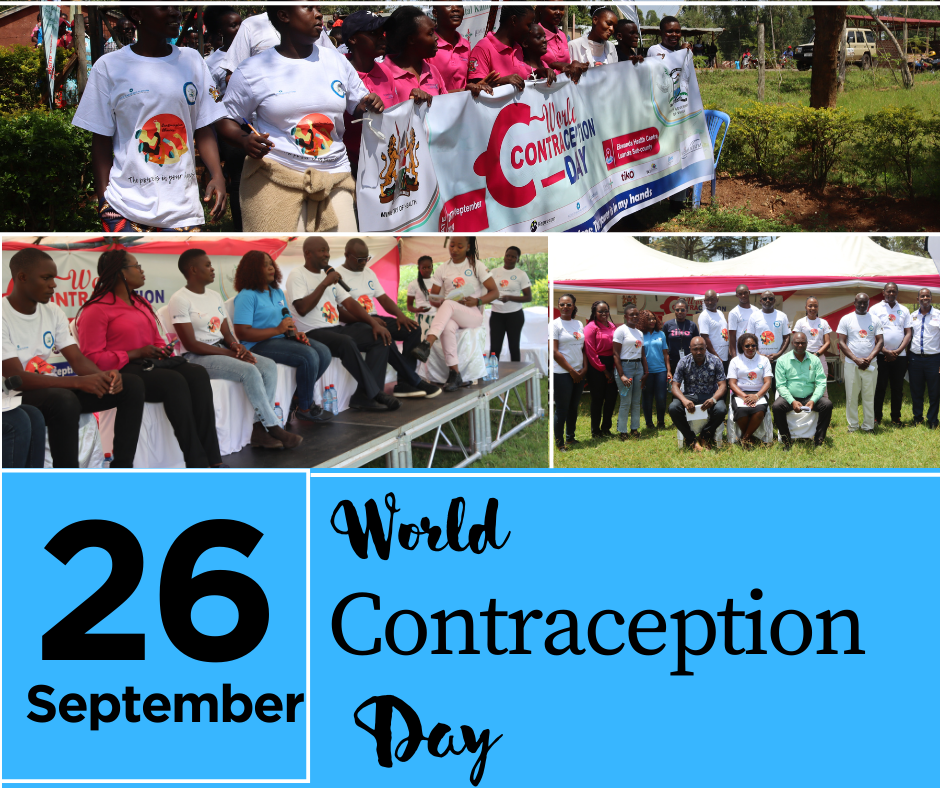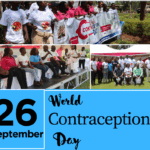
A Choice for All: Voices from the Community on Contraception, Agency and Access
Every year on September 26, the world celebrates World Contraception Day. This day is about more than just contraception methods; it’s about dignity and choice. This year’s theme, “A Choice for All: Agency, Intention and Access,” deeply resonates with the community voices we have captured from Kakamega, Kisumu and Siaya counties. It is clear that contraception is not just a commodity; it’s about culture, power dynamics, and trust in health systems.
Agency: From control to support and partnership

In many communities, a woman’s ability to choose her contraceptive method is often influenced, or even controlled, by her partner. Outdated patriarchal norms have long positioned men as the primary decision-makers in reproductive health. Some men fear contraception will deny them sons or view it as a threat to their authority.
However, when men are engaged as partners rather than obstacles, women’s autonomy strengthens, children benefit, and communities thrive. As a father from Matungu shared,
For a long time, I thought family planning was for women only. But now I see, if I support my wife, we both win. We can raise our children better.
Agency multiplies when men stand with women, not in their way.
Intention: Dispelling myths surrounding contraception with facts

Even when the desire to plan families exists, misinformation often clouds intention. In all the community dialogues held in Kakamega, Kisumu and Siaya, myths were a recurring theme. Some men believed contraceptives “reduced a woman’s libido,” threatening intimacy. Others like a young mother in Rarieda shared her fear on use of the coil:
I was told if I use the coil, it will disappear inside my stomach. That fear made me avoid it for years.
Others expressed fears of infertility, cancer or even death. These myths are not trivial; they shape people’s willingness or unwillingness to seek services. What was inspiring was watching how healthcare workers broke down these misconceptions patiently with facts but also recognition that there were still a lot of gaps in dispelling misinformation. They explained that side effects varied, that there are multiple methods, and that no one method fits all. By the end of the sessions, most men admitted that they had been misled by lack of appropriate information on contraception. When provided with clarity, fear gives way to openness, and the intention to use family planning grows from trust, not pressure.
Access to contraception: More than just stock on the shelves
Agency and intention become meaningless if services are out of reach. Choice without access is an empty promise. In Ugenya, women voiced frustrations over erratic supplies of injectables. In Rarieda, women noted that contraceptive commodities often run out, forcing families to abandon their preferred methods.

One of the most difficult truths that emerged from the dialogues was the age of consent restriction, which continues to bar adolescents from accessing contraceptives at health facilities. As a result, many young people are forced into unsafe alternatives, where their only perceived option is to purchase emergency contraceptives over the counter.
This reliance comes at a cost, as it involves frequent, unregulated use without full knowledge of the side effects or the fact that it is not intended for repeated use. This reality exposes a dangerous gap in our health system, adolescents are not lacking in intention, they are lacking in safe, youth-friendly, and stigma-free services. Until these barriers are addressed, young people will continue to navigate risky pathways that undermine both their health and their trust in the system.
These stories mirror the broader national picture of unmet need for family planning. According to the Kenya Demographic and Health Survey (KDHS) 2022, about 14% of currently married women in Kenya have an unmet need for family planning, meaning they want to delay or avoid pregnancy but are not using any method. The figure is even higher among adolescents and young women, who face the double burden of stigma and systemic barriers.
The Kenya Health Information System (KHIS) further reveals the service-delivery gap. Postpartum family planning uptake remains alarmingly low: nationally, only about 6% of women receive a method within 48 hours of delivery, a critical window for preventing unintended pregnancies. In some counties like Narok and Kajiado, uptake is as low as 2–3%. Even in better-performing areas, few exceed 20%.

This is not just about statistics but a representation of thousands of women and girls whose reproductive intentions are not being met. It is a stark reminder that unmet need for family planning is not a personal failure, but a systemic one. Every missed opportunity translates into higher risks of unintended pregnancies, maternal complications, and disrupted futures for young women.
Access, therefore, must mean more than stock on shelves. It must mean consistent supplies, trained and empathetic providers, and survivor- and youth-friendly services that uphold dignity and choice for all.
Community Power: Champions for Change
Despite the challenges, there is immense hope. Communities themselves are showing readiness to lead change. Chiefs have pledged to integrate the dissemination of family planning information during meetings. Men volunteered to share accurate information among peers. Mothers promised to correct myths and explore various methods of contraception as long as it works for them.
One elderly woman in Matungu summed it up beautifully:
We may have grown up with certain beliefs, but if we learn the truth, we should not keep it to ourselves. We must pass it on.
Looking Ahead: From Words to Action
Marking World Contraception Day this year, I am reminded that contraception is not merely a health intervention but a foundation for equity, dignity, and opportunity.
- Agency means women and girls can make decisions free from coercion or control, supported by partners and communities.
- Intention means myths give way to accurate, accessible information that empowers people to choose with confidence.
- Access means commodities, services, and respectful providers are available consistently, and that no one is turned away because of age, marital status, or stigma.
It is the courage of a man saying, “I will stand with my wife.”
It is a mother realizing that myths no longer have to dictate her decisions.
It is a girl daring to demand services that treat her with respect.
As communities in Kakamega, Kisumu and Siaya have shown, the pathway to a future where every pregnancy is wanted, every childbirth is safe, and every young person’s potential is fulfilled lies not only in clinics, but in conversations, commitments and collective courage.



